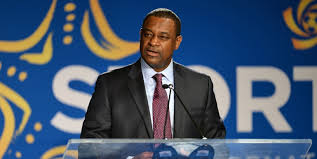April 14 – This Thursday the Confederation of North, Central America and Caribbean Association Football (CONCACAF) will gather its national federations in Bahamas for what will be the third annual congress under the presidency of Jeffrey Webb. It has been a period of dramatic transformation and reform for the confederation and produced a regional governing body that is virtually unrecognisable in comparison to what had gone before.
Under Webb’s leadership, CONCACAF has successfully implemented initiatives that provide credibility, accountability and transparency to the organisation. That focus on improvements off the field has also led to impressive performance on the field.
Webb is running unopposed for re-election in the Bahamas. In his short but long three years in charge he has implemented new leadership, instituted fiscal controls, introduced committees to improve transparency, committed to more inclusive governance to empower its member organisations, built promising partnerships and promoted the values of equality, respect and integrity.
CONCACAF had arguably the confederation’s best ever showing at the last year’s FIFA World Cup in Brazil, with USA, Mexico and Costa Rica exceeding their own expectations.
Shaka Hislop, a former professional player, said: “In the last three years, CONCACAF has risen to heights previously unattainable. By garnering a confederation-first approach, the traditional powerhouses have helped to raise the level of all within the region. Webb has been a dynamic presence.”
CONCACAF’s reform efforts have contributed to a stronger commercial future. In 2014, CONCACAF unveiled its first ever official partner – Scotiabank – as well as new partnerships with the International Criminal Police Organization (INTERPOL), UEFA, the European Sports Security Association (ESSA) and the International Centre for Sports Studies (CIES). CONCACAF also reached an historic agreement with CONMEBOL to host the 2016 Centennial Cup America – the first time the event will be played outside of South Africa.
“Football is bigger than any of us,” Webb said. “It can provide unprecedented opportunities for our youth and create avenues for our children to express themselves through focus, discipline and determination. Our main mission at CONCACAF is to Educate, Develop and Win, which we have been working tirelessly to achieve since 2012. Three years later, collectively we have made significant progress in the region.”
To that end, CONCACAF has championed the collective interests of members on a regional and global scale. Since 2012 CONCACAF has increased investment in its members by creating more standing committees that make decisions on all aspects of the game.
This new era for the Confederation has given local players and regional teams promising new opportunities. Many countries have hosted CONCACAF World Cup qualifying championships, providing them positive exposure to build the country’s football base, attract thousands of fans and inspire youth players.
Webb’s vision is that every man, woman and child passionate about football has the opportunity to access the beautiful game and develop their talent, so that the region can benefit from great football.
Before 2012, there were no development initiatives, programmes or youth tournaments. Since then, CONCACAF has increased investment in development by 20% and hopes to inject up to 70% more over the next four years.
To date, CONCACAF has established and implemented more than 80 development courses across the region, as well as creating the first official licensing programme for coaches. Women’s football has also taken a foothold in the Confederation, with new initiatives designed to educate, promote and inspire improvements to the women’s game. The most recent enterprise is the establishment of the Caribbean Professional League Task Force, which has been examining the feasibility of a professional league in the Caribbean. The goal is to improve the standards of football played and ultimately the quality of the game in the CONCACAF region.
“The continued focus on regional grassroots development, coach licensing, youth football for both sexes at all levels, and a professional league to help further raise the level of the CFU nations, the future of CONCACAF looks even brighter,” Hislop said.
Contact the author of this story at moc.l1744364647labto1744364647ofdlr1744364647owedi1744364647sni@l1744364647airot1744364647ide1744364647

